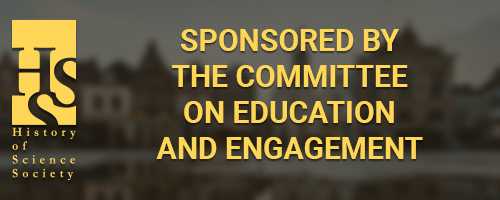
The importance of the history of science to science education has been recognized since the founding of HSS, formalized in the establishment of the Committee on Education in 1981 to facilitate "the role of history of science in education at all levels." While most members of HSS are involved in undergraduate education in some form, significant gaps between the profession and the field of K-12 education remain. This roundtable session will provide a venue to discuss new opportunities for engagement and collaboration between historians of science and educators at all levels, with a focus on new media and expanding initiatives in middle and high school teacher training. It will explore the variety of ways that historical perspectives can enrich science teaching––by providing compelling narratives; by demonstrating the methods and nature of science; by building cross-curricular connections; by humanizing scientists and addressing issues of diversity in STEM; and by exploring the ethics, values, and social context of science. This roundtable includes participants involved in science education efforts in the private (CrashCourse) and government (Bureau of Educational and Cultural Affairs, US Department of State) sectors, as well as academia (UTeach). Participants will share their experiences both in the classroom and in developing film and online resources to transfer the insights of the history of science beyond the profession.
Sponsored by the Committee on Education and Engagement
The importance of the history of science to science education has been recognized since the founding of HSS, formalized in the establishment of the Committee on Education in 1981 to facilitate "the role of history of science in education at all levels." While most members of HSS are involved in undergraduate education in some form, significant gaps between the profession and the field of K-12 education remain. This roundtable session will provide a venue to discuss new opportunities for engagement and collaboration between historians of science and educators at all levels, with a focus on new media and expanding initiatives in middle and high school teacher training. It will explore the variety of ways that historical perspectives can enrich science teaching––by providing compelling narratives; by demonstrating the methods and nature of science; by building cross-curricular connections; by humanizing scientists and addressing issues of diversity in STEM; and by exploring the ethics, values, and social context of science. This roundtable includes participants involved in science education efforts in the private (CrashCourse) and government (Bureau of Educational and Cultural Affairs, US Department of State) sectors, as well as academia (UTeach). Participants will share their experiences both in the classroom and in developing film and online resources to transfer the insights of the history of science beyond the profession.
Sponsored by the Committee on Education and Engagement
Drift 13, Rm. 004 History of Science Society 2019 meeting@hssonline.orgTechnical Issues?
If you're experiencing playback problems, try adjusting the quality or refreshing the page.
Questions for Speakers?
Use the Q&A tab to submit questions that may be addressed in follow-up sessions.